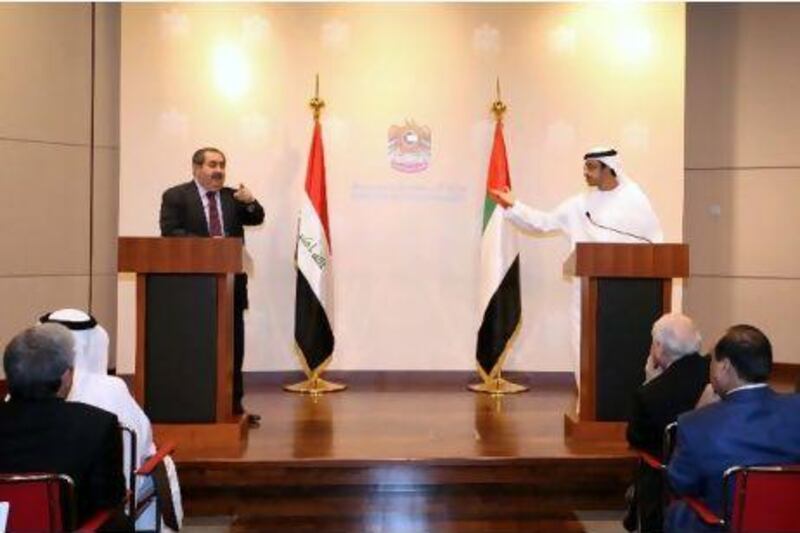ABU DHABI // The UAE will cancel Dh21.3bn in debt owed by Iraq, Sheikh Abdullah, the Foreign Minister, announced yesterday after a meeting with his Iraqi counterpart.
Sheikh Abdullah and Hoshyar Zebari also discussed regional issues, confirming that sending Arab troops to intervene in Syria is on the agenda of next week's Arab ministerial meeting.
They stressed the importance of diplomatic dialogue between the region's countries and Iran over the impact of closing the Strait of Hormuz on the oil market.
Media escalation of Iranian threats to block the Strait of Hormuz "is not to the benefit of the region or the stability of the oil market", Sheikh Abdullah said. "We know the world economy is passing through a crisis and we all know as producers, and other countries that are consumers, that we should look through the technicalities of the oil market, not only by securing the straits but also through speculation - it all should be looked into more seriously."
The Iraqi foreign minister described the issue of trusting Iran as a "big crisis" .
Iraqi officials have been sending letters to Iran warning it of the risks of closing the strait, especially in maintaining oil market stability.
"We don't want to [resolve the issue] through military forces but through dialogue and calming the situation," said Mr Zebari.
He thanked the UAE for writing off his country's debts.
"The relations between the two states did not stop [in the past 10 years] but today we started the official framework of co-operation," he said. "We thank the UAE for cancelling the debts on Iraq, which was a very heavy burden."
In a surprise move in 2008, the UAE wrote off almost US$7bn worth of Iraqi debt left over from the era of Saddam Hussein.
The debt, consisting of loans and grants, dated back to the 1980s, when Gulf states lent money to help Iraq during its long-running war with Iran.
Iraq and the UAE are among nations who have sent monitors to Syria. Iraq has sent 33 observers as part of the Arab League's monitoring team and provided armoured vehicles for transport. The UAE has 12 observers and it is not considering withdrawing them or adding to them, said Sheikh Abdullah.
The ministers said the next Arab ministerial meeting would be held on Sunday in Cairo, following the meeting of the Arab League's committee on Syria on January 2.
They will discuss Qatar's suggestion to send foreign troops to intervene in Syria.
When asked if the UAE favoured such a move, or what its primary interpretation is of what the meeting would decide, Sheikh Abdullah said it depended on the suggestions and discussions that would be made. Sheikh Abdullah said regional unrest greatly worried the UAE and Iraq and was discussed during their meeting.
The ministers described their military relationship as strong, but said it had to be improved.
Trade between Iraq and the UAE reached more than US$4.5bn last year, they said.
The next Arab summit will be held in Iraq but a date has not been confirmed.
Meanwhile, Mr Zebari said the recent summoning of the Turkish ambassador to Baghdad was due to comments made by Turkish officials, who intervened in Iraq's internal situation.
"We appreciate very much our relationship with Turkey as our top trading partner in the region ... but it is important to let them know how far can this go, especially when we have internal difficulties," he added.







